This week’s books range from fiction set in Japan’s Meiji era and some rock’n’roll fiction to Elizabeth Gilbert’s revealing memoir and the secrets of birdsong.
FICTION PICK OF THE WEEK

I Am a Cat
Natsume Sōseki
Vintage Classics, $32.99
Before cats became masters of the meme-verse, before the Andrew Lloyd Webber musical, and before even its source material, T.S. Eliot’s Old Possum’s Book of Practical Cats (1939), there was Natsume Sōseki’s I Am a Cat (1905-6). The satirical classic gives a cat’s eye view of Japanese literati during the late Meiji period. It’s told by an anonymous moggie who arrives in the household of a pseudo-intellectual, Sneaze, and makes catty observations about the professors and scholars and poets who congregate there. The Meiji era coined the Japanese word tsundoku – a term for buying books and allowing them to pile up unread – which should give you some idea of how status-obsessed these bookish humans are. Our cat narrator unsheathes its claws and takes wry swipes at every foible and flaw – from the physical loathing the humans seem to display for themselves and each other, to tensions between Western and Japanese philosophical and cultural traditions. The narrator itself isn’t beyond reproach – the cat assumes it has won celebrity status after randomly photobombing a postcard – though that only adds to the charm of this cynical, surprisingly prescient satire of human failings.
Fireweather
Miranda Darling
Scribe, $29.99

A sequel to Thunderhead (2024), Miranda Darling’s Fireweather delves into the mind of a woman on the verge of – for want of a better word – madness. Or is it the world that’s gone mad? In the previous book, we got a day in the life of Winona Dalloway, confined by suburban domesticity and motherhood. It fused black comedy with interior mental landscape and found itself in conversation with Virginia Woolf, among other feminist forebears. In Fireweather, we get drawn into Winona’s mind as her marriage looks like ending in divorce and her children are absent. The world is on fire, literally, with black ash falling from the sky. Internally, Winona splits into multiple voices – dissociating into archetypes such as The Archer, The Nanny and The Poet – as she falls down a mental health rabbit-hole. She thinks she’s sane. Increasingly, mental health professionals disagree. Darling writes feminist fiction infused with wit, intertextuality and a poetic command of language, creating a compelling, intricate internal voice that stands, too, as a critique of institutional misogyny in psychiatry.
Eleanor Jones Is Playing with Fire
Amy Doak
Penguin, $19.99

The third in Amy Doak’s award-winning Eleanor Jones series of YA mysteries (after Eleanor Jones Is Not a Murderer and Eleanor Jones Can Keep a Secret), immediately demonstrates its appeal, even to the uninitiated. Doak has created a wry and relatable adolescent narrator, at home in a gossipy world of teen crushes and high-school drama yet thrust into solving crimes. At the novel’s opening, she still hasn’t kissed love interest Troy, and no less importantly, there’s an arsonist on the loose in Cooinda, the rural town Eleanor moved to with her mother Min in the first book. Is a spate of car thefts potentially linked to the fires? Eleanor’s warned off investigating by a local cop, but trouble has a way of seeking her out and, in any event, someone must get to the bottom of the mystery before the whole of Cooinda goes up in smoke. Eleanor’s an entertaining teen narrator, her circle of friends is realistically drawn, and the mix of schoolyard romance and puzzle-like detective fiction should, I imagine, make this an addictive series for an early high school audience.
Hot Wax
M.L. Rio
Wildfire, $32.99

I’ve lost count of how many rock’n’roll novels I’ve read over the years, but almost without exception the genre is expected to tick two boxes. You’ve got to write a love letter to the power of music, on the one hand, and a sharp indictment of the dark side of the industry, on the other. M.L. Rio’s Hot Wax cleaves to the mould, though the narrative has an unexpected twist, and enough depth of character to keep it from feeling completely formulaic. The split narrative follows Suzanne from 10 years old. She’s drawn to her dad’s world of fast cars and electric guitars and accompanies a rock band on a concert tour, where she witnesses fame and infamy intertwining. Years later, Suzanne settles down with a dull husband, Rob, but when her father suddenly dies, she abandons suburbia for the road, determined to find out what happened. Rob isn’t happy about it, planning to track Suzanne down to confront her. M.L. Rio is the author of the BookTok sensation If We Were Villains: this latest should appeal to her fans, even if it seems undistinguished to connoisseurs of rock music fiction.
Slashed Beauties
A. Rushby
HQ, $32.99

Wax dummies made from 18th-century sex workers – so-called Anatomical Venuses – are imbued with fatal, supernatural powers of vengeance. They come to life and murder any man who dares a lustful glance. (Take that, male gaze!) Such is the conceit of A. Rushby’s Slashed Beauties. In the modern day, antiques dealer Alys is intimately connected to the wax figures. Entrusted with transporting one of them safely, she seeks to prevent uncontrolled magical mayhem from being unleashed. Back in 18th-century London, we follow the fortunes of the three women whose bodies were models for the wax figures. All are involved in the sex industry. Young ingenue Eleanor falls in with Elizabeth, a kept woman who opens a high-class brothel. Entering a world of luxury and corruption alongside fellow newcomer Emily, Eleanor finds herself well-compensated, financially free, but on a dark path she cannot control. Some elements of the world-building are under-realised and the prose is largely pedestrian. If you read only for plot, however, this blend of sisterhood novel and feminist revenge fantasy might just grab you.
NON-FICTION PICK OF THE WEEK

Love’s Labour
Stephen Grosz
Chatto & Windus, $36.99
When I read psychoanalyst Stephen Grosz’s previous book The Examined Life, I found myself wishing I could bring him my troubles. He is the kind of listener we all want. Attentive, rigorous, non-judgmental. This is not to suggest he presents himself as someone who can “fix” his patients’ problems. Analysis, he stresses in his latest collection of case studies, Love’s Labour, is a collaboration. If love’s labour is “the work we must do to see clearly ourselves and our loved ones”, much of that labour is a joint effort carried out in the analyst’s consulting room. Take the story of Matt. His closest relationships don’t feel real because he has been conditioned to repress anger and hate. When he sends Grosz a furious email saying that he doesn’t like him, Grosz knows progress has been made. Then there’s Ravi, who’s convinced his wife is having an affair. He breaks off the analysis, allowing this delusion to ultimately ruin his love for her because he can’t let go the “ecstasy of sanctimony”. Love’s labour, Grosz reminds us in this moving and insightful work, is never done.
All the Way to the River
Elizabeth Gilbert
Bloomsbury, $34.99

On the surface, everything looked great. Elizabeth Gilbert’s novel The Signature of All Things had shown those who dismissed her as a chick-lit lightweight after the phenomenal success of Eat, Pray, Love that she was a serious, literary writer. But beneath the surface, chaos brewed. Although happily married, Gilbert was in love with her closest friend, Rayya Elias, but couldn’t admit to it. Only when Elias was diagnosed with terminal cancer did their bottled up love explode. “We were ecstatic, phosphorescent, dangerous, brilliant and full of wild courage,” she writes. Until, that is, this wild ride turned into a nightmare as Elias succumbed to her cocaine addiction and Gilbert fuelled it with her addiction to love and sex. Gilbert doesn’t spare herself or Elias while laying bare how abject and wretched they became. But, as a recovering addict, she believes that the truth is what sets you free. The high voltage intensity of this memoir, with its operatic declarations, is not for everyone.
Apron-Sorrow/ Sovereign-Tea
Natalie Harkin
Wakefield Press, $49.95

“Sovereign-Tea.” There is so much packed into this poignant play on words. It speaks of the constraints on Aboriginal women in domestic servitude and of their quiet strength. Their job was, as Natalie Harkin so eloquently puts it, to “clean up the colonial mess”. To keep the white settlers’ homes tidy, to look after their children. Even though they themselves might have been taken from their parents or had their children taken from them. The documents Harkin has retrieved from the archives lay bare the chilling and patronising mentality of the colonial bureaucratic mind. A State Lady’s report on one Aboriginal woman in domestic service reads: “You need firm handling. You must realise that you cannot have your own way always in this world”. Set against this exercise of state power are the women’s stories and the memories of their descendants. Stories imbued with sadness but also with resourcefulness and dignity. Stories of artistic and musical talent, of determination and spirit. Here, their labour is made visible, their voices heard.
Swellbeing. Everyone Deserves to Feel Awesome
Blake Johnston
Hachette, $34.99

“The overpowering pain that someone is feeling when they take their own life doesn’t go away when they die. It just gets passed on to the people who love them.” Blake Johnston knows this because his father ended his own life. And no one saw it coming because his father, like many men, kept his emotions under wraps. Even before his father’s death, Johnston himself was struggling with anxiety. Afterwards, he slowly began to tune into what was going on inside his mind and heart, and take his physical and mental health into his own hands. He set himself goals, rising early, running, swimming in the ocean, doing breath work, having coffee with friends. The goals got bigger until he committed to the world’s longest surf session to raise money for youth mental health. Surfing had been his first love. The ocean had taught him that all is change and that if you embrace it, you thrive. This down-to-earth memoir offers those who are struggling a model for how they can help themselves.
Why Do Birds Sing?
Grainne Cleary
Allen & Unwin, $34.99

Bird song lifts our spirits, but what is the bird getting out of it? Male birds sing to impress potential female mates with their vocal strength, the complexity of their song and repertoire. While female birdsong was traditionally thought to be rare or aberrant, recent studies show this is not the case, especially in Australia, the evolutionary home of the songbird. Like male songbirds, females sing to defend their territory and to communicate with their mate, whether soliciting copulation or providing for offspring. Young birds learn to sing in the same way humans learn language – by mimicking those around them. And, a bit like teenagers impressed by their friends’ musical taste, they show a “conformist bias”. This informative work is not just about song, however. It looks at wider questions from consciousness and dreaming to whether bird brains can help us better understand human neurology and diseases that afflict it.
The Booklist is a weekly newsletter for book lovers from Jason Steger. Get it delivered every Friday.


















































